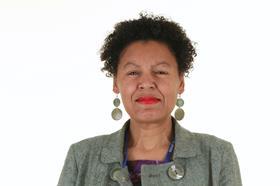Ifti Majid and Danielle Oum explain why clarity of vision is vital as we strive for a healthcare system where ethnicity becomes irrelevant to patient experience and outcomes, as well as staff experience and career prospects
Discrimination and inequality cost lives. This is a fact that has been laid bare time and again – recently, by the scandals of Grenfell and Windrush, and now by the disproportionate damage covid-19 is causing to the black and minority ethnic communities. It has also sparked global protests against racism and police brutality in the wake of the killing of George Floyd.
Sponsored by
In the case of George Floyd, direct discrimination led to his death. In the UK, we have our own equivalent cases, similarly caused by structural and systemic issues. In response, we are starting to see action around the world, and we hope this will be a catalyst for real change.
 Ifti Majid
Ifti Majid
That change must include health and care.
In health and care, we are at a point now where making hasty efforts to virtue signal with platitudes or interventions that are not evidence-based must stop. Not being racist is not enough.
 Danielle Oum
Danielle Oum
As healthcare leaders and as individuals working in health and care, we must be wholeheartedly anti-racist, applying evidence-based approaches and hold ourselves to account for delivery.
We must show that black lives matter, and ensure that Richard “Cartoon” Campbell, David “Rocky” Bennet, Olaseni Lewis and so many others have not died in vain.
It is well-documented that ill-treatment leads to ill health, and non-inclusive health services can exacerbate the socioeconomic determinants of health inequalities.
Evidence shows that too often, health outcomes and satisfaction for BME service users and staff fall significantly below those of the white community, and healthcare leaders need to act on that.
Clarity of vision is vital: we must strive for a healthcare system where ethnicity becomes irrelevant to patient experience and outcomes, as well as staff experience and career prospects.
It is well-documented that ill-treatment leads to ill health, and non-inclusive health services can exacerbate the socioeconomic determinants of health inequalities
The current Sustainability and Transformation Partnership/Integrated Care Systems service planning provides an opportunity to reset the range and delivery of health and care provision to better meet the needs of all disadvantaged communities.
Similarly, while the covid-19 crisis has generated interest in workforce inequalities, there is an opportunity to re-engineer the approaches to colleague recruitment, development and progression, with ambitions defined at system level and delivered by organisations.
We also need to hear BME voices and perspectives at all levels and across the range of occupations in healthcare, including in leadership positions. There must be real representation of our communities among health leaders, for example in primary care, and on NHS boards, including non-executive directors. That will require concrete action across the NHS system, rather than the current tendency to focus on hearts and minds.
That means a large-scale dismantling of advantage and privilege and structural inequality, rather than focusing on supporting a few from disadvantaged groups to navigate the unfair system and assuming that the job is done.
It is also imperative for leadership to support our NHS management communities to understand the historical context behind issues like health inequalities, racial discrimination, and structural inequalities. That must include difficult discussions about things like slavery and Empire, and how their invidious legacy continues to infect the foundations of modern society.
But we do hear from colleagues that there is a real danger in adopting a completely top-down approach to inclusion in the NHS, and there must be engagement at a grassroots level among the workforce. Right now, there is a sense of mistrust, and a sense that change is not real, but is driven by a requirement to tick boxes.
The key to gaining the trust and confidence of our BME workforce is action. More than that, it is action that is co-created locally to address specific issues in each organisation and/or community – this is why a wholesale top-down approach will not work on its own.
We need to see the implementation of mechanisms for holding NHS leaders and managers at an organisation level to account for making improvements. That does not just mean at a regulatory level, such as through the Care Quality Commission or NHS England and NHS Improvement: it is also about being held to account by our own BME colleagues, and beyond that, our diverse local communities.
We need to see the implementation of mechanisms for holding NHS leaders and managers at an organisation level to account for making improvements
The NHS carries great influence, particularly at the moment; how we work together in an inclusive way with our BME colleagues and local communities will have a significant impact on the wider societal problems we need to tackle.
There is work already going on in trusts, in terms of engaging with staff, and moving towards addressing structural inequalities. But our members are clear there is more to do here across the health service, both to support staff more effectively and to reach out to communities to shape the services we offer and to engage patients in their care and ensure accountability.
This was most recently heavily underscored by the findings of Public Health England’s report on understanding the impact of covid-19 on BME groups, in which national bodies pointed to racism and discrimination experienced by communities and especially by BME key workers as a factor affecting health, and in affecting disease exposure risk and disease progression risk.
As healthcare leaders, we can either help anchor our communities or contribute towards destabilising them. We must make every effort to end the direct and indirect discrimination BME communities face.
We at the NHS Confederation will also aim to play our role in progressing this debate by shining a light on this issue through NHS Reset, by hosting the Race and Health Observatory, by hosting the BME Leadership Network and by also examining our own practices as an employer.
Ifti Majid is chief executive of Derbyshire Healthcare Foundation Trust and Danielle Oum is chair of Walsall Healthcare Trust.


























